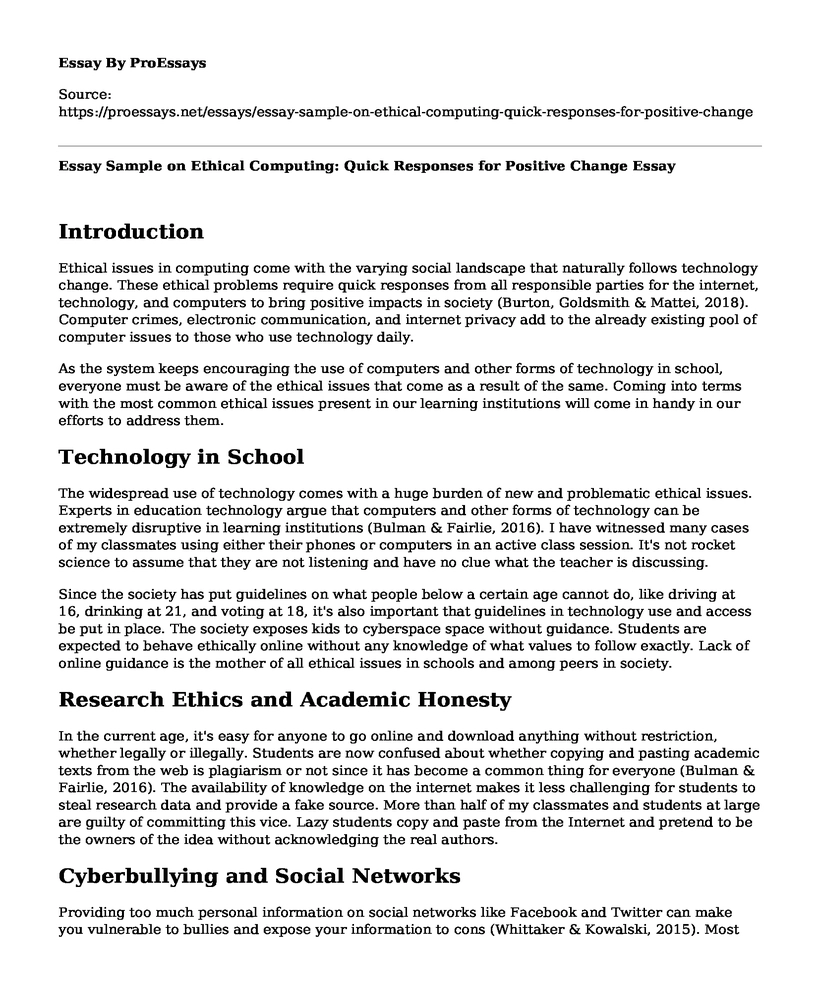Introduction
Ethical issues in computing come with the varying social landscape that naturally follows technology change. These ethical problems require quick responses from all responsible parties for the internet, technology, and computers to bring positive impacts in society (Burton, Goldsmith & Mattei, 2018). Computer crimes, electronic communication, and internet privacy add to the already existing pool of computer issues to those who use technology daily.
As the system keeps encouraging the use of computers and other forms of technology in school, everyone must be aware of the ethical issues that come as a result of the same. Coming into terms with the most common ethical issues present in our learning institutions will come in handy in our efforts to address them.
Technology in School
The widespread use of technology comes with a huge burden of new and problematic ethical issues. Experts in education technology argue that computers and other forms of technology can be extremely disruptive in learning institutions (Bulman & Fairlie, 2016). I have witnessed many cases of my classmates using either their phones or computers in an active class session. It's not rocket science to assume that they are not listening and have no clue what the teacher is discussing.
Since the society has put guidelines on what people below a certain age cannot do, like driving at 16, drinking at 21, and voting at 18, it's also important that guidelines in technology use and access be put in place. The society exposes kids to cyberspace space without guidance. Students are expected to behave ethically online without any knowledge of what values to follow exactly. Lack of online guidance is the mother of all ethical issues in schools and among peers in society.
Research Ethics and Academic Honesty
In the current age, it's easy for anyone to go online and download anything without restriction, whether legally or illegally. Students are now confused about whether copying and pasting academic texts from the web is plagiarism or not since it has become a common thing for everyone (Bulman & Fairlie, 2016). The availability of knowledge on the internet makes it less challenging for students to steal research data and provide a fake source. More than half of my classmates and students at large are guilty of committing this vice. Lazy students copy and paste from the Internet and pretend to be the owners of the idea without acknowledging the real authors.
Cyberbullying and Social Networks
Providing too much personal information on social networks like Facebook and Twitter can make you vulnerable to bullies and expose your information to cons (Whittaker & Kowalski, 2015). Most young users think that social networks are anonymous; thus, no care should be taken when posting personal information. The truth about it is that everyone is responsible for whatever they put out there, which can later affect us negatively in one way or another.
I have witnessed cases of students using the official social media accounts of institutions to bully fellow students. One student used to take pictures of the victim and posting them on the forum. The bullying student used these photos to make fun of the victim every second. The school ensured appropriate measures are taken to address this issue of cyberbullying.
Conclusion
Just like other industries, values, and ethical guidelines related to the computer industry must be put into place to direct users on what should and should not be done. Ethics in computing will address the current ethical issues and possibly prevent future issues from occurring. Technology users must also understand the privacy terms before agreeing to them.
References
Bulman, G., & Fairlie, R. W. (2016). Technology and education: Computers, software, and the internet. In Handbook of the Economics of Education (Vol. 5, pp. 239-280). Elsevier. Retrieved from
https://www.nber.org/papers/w22237.pdf
Burton, E., Goldsmith, J., & Mattei, N. (2018). How to Teach Computer Ethics with Science Fiction. Communications of the ACM. Retrieved from
https://par.nsf.gov/servlets/purl/10048703
Whittaker, E., & Kowalski, R. M. (2015). Cyberbullying via social media. Journal of School Violence, 14(1), 11-29. Retrieved from
https://esteemjourney.com/wp-content/uploads/2018/06/Cyberbullying-Via-Social-Media.pdf
Cite this page
Essay Sample on Ethical Computing: Quick Responses for Positive Change. (2023, Feb 23). Retrieved from https://proessays.net/essays/essay-sample-on-ethical-computing-quick-responses-for-positive-change
If you are the original author of this essay and no longer wish to have it published on the ProEssays website, please click below to request its removal:
- Box Station - Analysis of Vulnerabilities
- Digital Diplomacy Essay
- Search Engine Optimization and Database Management System
- Secure Your Network: Understanding Security Branches - Essay Sample
- Essay Example on Data Breach Due to Cloud Misconfiguration, Impacting Millions
- Essay Example on Internet Censorship: Necessary for a Better Web Experience?
- Essay Sample on Fully-Functioning Mobile Apps: The Future of Sales







